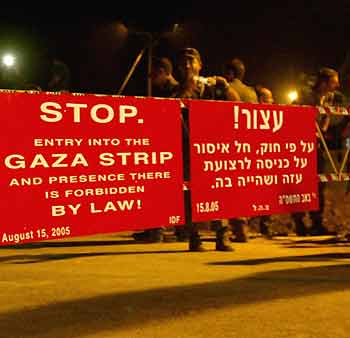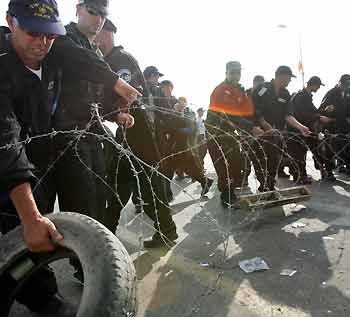|
Israel seals Gaza settlements, sets deadline
(Reuters)
Updated: 2005-08-15 12:46
Israel set its Gaza pullout into motion on Monday, blocking access to Jewish settlements in the occupied territory and giving settlers a 48-hour deadline to leave or be forcibly removed, Reuters reported.
Eviction notices to the 9,000 settlers in all 21 settlements in Gaza and four of 120 in the West Bank went into effect at midnight on Sunday, setting the stage for what could be one of the most traumatic chapters in the Jewish state's history.

A red sign that reads "Stop. Entry into the Gaza Strip and presence there is forbidden by law!" is seen at a gate in Gaza, August 15, 2005. [Xinhua] |
Hardline settlers, many vowing to resist evacuation, erected makeshift barricades in several places in an attempt to block security forces who planned to begin knocking on doors after daybreak to tell people they must get out by Wednesday.

A Jewish settler cries as she holds onto a gate after Israeli police arrive in front of an entrance of the Jewish settlements of Neve Dekalim in the Gush Katif bloc of Jewish settlements in the southern Gaza Strip August 15, 2005. [Reuters] |
The pullout, claimed by Palestinian militants as a victory and decried by Israeli opponents as a surrender to violence, will mark the first evacuation of Jewish settlements from land Palestinians want for a state.
Under floodlights after midnight at the Kissufim Crossing on the Gaza border leading to the Gush Katif settlement bloc, the army lowered a gate with a red sign that declared: "Stop. Entry into the Gaza Strip and presence there is forbidden by law!"
SETTLERS STREAM OUT
Along a side road, a constant stream of settlers and trucks loaded with belongings left the Gaza settlements to comply with Prime Minister Ariel Sharon's plan to "disengage" from conflict with the Palestinians.
Heading in the opposite direction, some 50 military vehicles, including jeeps, ambulances and buses carrying police and soldiers, drove into the Gaza Strip.
By rare agreement with Israel, 7,500 Palestinian security men in Gaza moved into position on the outskirts of the fortified settlements to ward off possible militant attacks.

Israeli police remove a barricade set up by Jewish settlers in front of an entrance of the Jewish settlements of Neve Dekalim in the Gush Katif bloc of Jewish settlements in the southern Gaza Strip August 15, 2005. [Reuters] |
Early on Monday one makeshift rocket slammed into a garden in the Neve Dekalim settlement and another hit the Gadid enclave but caused no casualties. Palestinian militants have largely observed a truce agreed by Palestinian President Mahmoud Abbas and Israel in February.
Troops planned to fan out in the settlements later in the day to issue eviction warnings.
But in an apparent bid to avoid early confrontations, the army said it had decided not to go into five of the settlements, widely seen as bastions of resistance, until evacuation day after settlers said the soldiers would not be welcome.
"We estimate that no more than 50 percent of the residents of Gush Katif and (the other settlement areas) in the Gaza Strip will remain beyond the 16th," Brigadier-General Guy Tzur, who oversaw the Kissufim closure, told reporters.
STATE COMPENSATION DEALS
Hundreds of Gaza settlers have signed state compensation deals to leave, but the army said 5,000 pullout opponents had slipped into the enclaves, raising fears of violence.
"We definitely won't make it easy for those coming to expel us," Gaza settler council chairman Avner Shimoni said.
Under the slogan "Jews don't expel Jews", settler leaders have been waging an emotional campaign against Sharon's plan to uproot settlements from occupied areas he said had little security value for Israel.
Palestinians welcome Israel's withdrawal from land captured in the 1967 Middle East war. But they fear Sharon devised the Gaza plan as a ruse to cement Israel's hold on most of the West Bank, where 230,000 settlers and 2.4 million Palestinians live.
Many settlers stake a biblical claim to Gaza and the West Bank. The World Court describes Israeli settlements as illegal. Israel disputes this.
Israel intends to leave the Gaza settlements and the four isolated enclaves in the West Bank by September 4.
Some settlers had vowed to deny the soldiers entry by locking the gates of their communities of red-roofed homes, many of them built with state-subsidised mortgages approved by Israeli governments of various political hues since the 1970s.
U.S.-led mediators hope the pullout, which opinion polls show a majority of Israelis favour, will breathe new life into a "road map" peace plan.
Under a deal with the Palestinians, Israel will demolish the settlers' homes. The Palestinian Authority wants to build high-rise housing on the plots to improve conditions in densely populated Gaza, where some 1.4 million Palestinians live.
Israel intends to complete the Gaza pullout in October, when the last Israeli troops are scheduled to leave. But, citing security concerns, it plans to retain control of Gaza's airspace and possibly its border crossings.
|